- 收入总额:27103400.95元
- 支出总额:23122739.73元
- 爱心人次:2240次
编者按:河北省唐山乐亭周边,有一片华北地区最大的候鸟迁徙区,面积有600多平方公里,是世界八大候鸟迁徙路线上重要的停靠站,每年约有三百八十种鸟类经此南下或北上,其中一级保护鸟类有17种,二级保护有60种,也是鸟类盗猎猖獗的区域。
田志伟是这里的一位候鸟保护志愿者,是绿会“中华水鸟保护地?唐山”的主任,也是唐港开发区大清河救助站的负责人,他从事候鸟保护已经有10多年时间了。
10多年来,田志伟几乎每天都会在湿地间的小道上巡视,调查湿地鸟类的生存状况,阻止偷捕者的行径,救助受伤的鸟儿,向当地居民宣传爱鸟、护鸟的道理,多年来的护鸟经验使田志伟仅凭肉眼就可以判断百米之外飞翔的是什么鸟类。爱鸟护鸟是他生活中的重要组成部分。
按/Talina 审/小飞 编/Angel
原标题:白天救鸟,晚上钻研,渤海湾神奇“鸟爸”救助上千候鸟重返蓝天 | Super Bird Father
In 2003, Tian Zhiwei saved 13 large wild birds from death. He fed each a kilogram of fish every day, going through three metric tons of fish in the six months that followed. An ornithologist informed him that the birds were oriental white storks, which have a population of less than 3,000 worldwide. They prefer Poyang and Dongting lakes in China for wintering, and Far East Russia for breeding.
2003年,他救助了13只中毒的野生大鸟。每只大鸟一天能吃一公斤鱼,半年的时间吃了他近三吨的鱼。后来他才从鸟类学家口中得知,这种大鸟就是国家一级保护动物东方白鹳,冬天在南方如鄱阳湖、洞庭湖一带越冬,春天飞到东北或俄罗斯远东地区繁殖,全世界仅存两千多只了。
When the birds recovered, Tian thought he could release them back to the wild, but they were unexpectedly sent to a zoo for show. When he visited them later on, he found only six remained.
半年的康复期后,本以为能将这些东方白鹳放归自然,没想到最后还是进了动物园供人观赏。后来,当他来到动物园看望这些东方白鹳时,仅剩下6只了。
The man made up his mind to build a rescue station to help injured wild birds, and ensure they go back where they belonged – the wild, instead of the zoo.
因此,他下定决心,将来一定要建立一个自己的救助站,救助受伤的野生鸟类,并把救助后康复的野生鸟类放归自然,而不是放入动物园遏制它们的野性。
And in 2011, that sanctuary was finally set up.
这个决心,终于在2011年落地了。
He used to be a soldier and worked in the aquatic products processing industry, but he decided to temporarily leave his job without a salary and devote his time to the conservation of wild birds.
当过侦察兵,做过水产加工的他,10年的时候决定停薪留职,在河北唐山包下一块地,建起了大清河盐场野生动物救助站,开启了野生鸟类保护生涯。他就是田志伟,生于1969年,河北乐亭人。
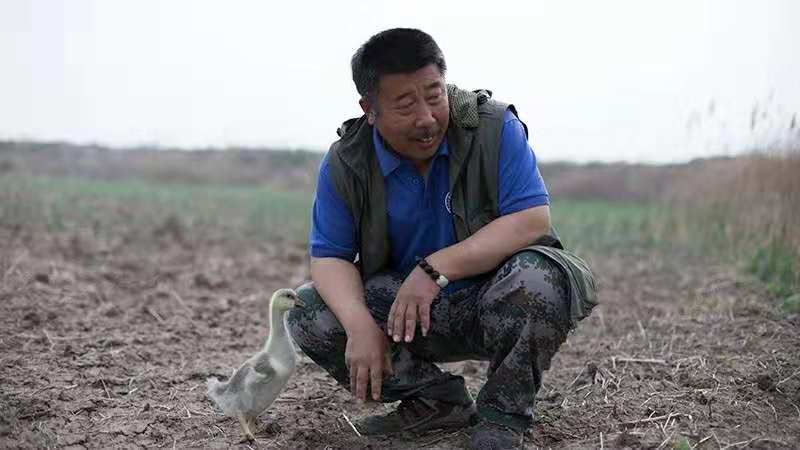
Tian takes care of a baby bird.
Tian was born in 1969 in China's Hebei Province.
He first came to Daqinghe salt field, the location of the present rescue station, at eight.
老田出生于乐亭县城,8岁来到大清河盐场,也就是现在救助站所在地。
Daqinghe salt field is on the northern bank of the Bohai Bay. Its coastal wetland has a wide intertidal zone. Its brine concentration breeds great amounts of Artemia salina and other biological resources, attracting a large number of wild birds looking for a spot to rest, forage and breed.
这里是渤海湾北岸,有大面积的滩涂。盐场的海水浓度,孕育了独特的丰年虫等生物资源。
It's the main stopover of the East Asian-Australasian Flyway and it plays an important role as a breeding site for many waders. More than 90 percent of the world's waders, including spoon-billed sandpipers, little curlews and grey-tailed tattlers, migrate through here.
这里是全球重要的水鸟迁徙路线东亚-澳大利西亚线上重要的水鸟停歇地和能量补给地,还是许多鸻鹬类的繁殖地。勺嘴鹬、小杓鹬、灰尾漂鹬等全世界百分之九十以上品种的鸻鹬类从这里迁徙。
Tian's love for birds stretches back to his childhood.
老田从小就看过很多鸟儿,从小就喜欢鸟儿。
It's no exaggeration that he's familiar with every kind of bird at the salt field. He knows what the birds are doing simply by hearing them chirp. He can also identify the species, and even the gender, from a hundred meters away.
毫不夸张地说,他对这里的所有鸟类了如指掌。鸟儿的一个动作,一声鸣叫,他能立马领会。百米外扑扇着翅膀的鸟儿,你可能还没看到,他却已经说出鸟种名称,甚至还分清了雌雄。
It is not because he has good eyesight, it's because of his passion for the birds.
In order to enrich his bird knowledge, he has read bird-related books and papers.
On top of that, he has put theory into practice.
很多人将此归功于他视力好,其实不然,视力好是一方面,更重要的是,他是用心在跟鸟打交道。他看了很多关于鸟类学的书,书中有关于鸟类习性的讲解,这些他都牢记于心。等到他再实地观察的时候,就能运用上了。他开玩笑说,这叫理论与实际的结合。
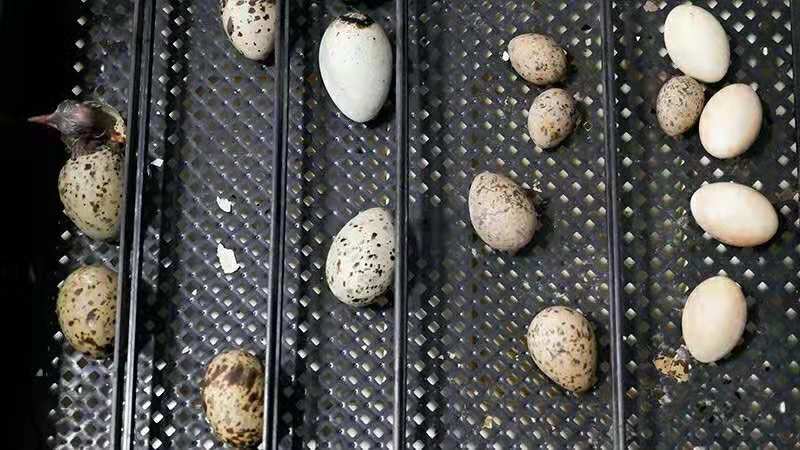
In spring, many waders come here for breeding. Bird conservationists will send eggs to rescue station when they find stolen eggs.
Over the last few years, he has committed himself to looking after the birds at the Daqinghe Rescue Station, which had only one room in 2011 when he first rented the land. However, Tian now has five areas to help the birds: a rescue area, recovery area, wild training area, artificial incubation area and nature education area.
老田把对鸟类的用心,融入了救助生活。救助站这35亩地,2011年时还是一片空地,而现在,已经有救助区、恢复区、野化区、保育区、和宣教区等五大功能区了。
Tian has helped more than 300 endangered birds, suffering from injury or poison, recover and return to the wild.
这期间救助并放飞野生鸟类有一千多只,其中国家一级、二级保护动物就有三百多只。它们多是受伤的,或是误食农药中毒的。
During breeding seasons, bird conservationists send eggs confiscated from poachers to the rescue station. Tian handles them with care and patience until they hatch.
繁殖期间,有些不法分子偷鸟蛋,附近被没收的鸟蛋,大多会送到老田这儿来。
In the summer of 2014, Tian helped 200 waders' eggs hatch. When 80 chicks were born, he began babysitting.
14年的那个夏天,老田一口气孵化了200多枚鸻鹬类的蛋。孵化可是个细致活,对温度、湿度都有特定的要求。
“I fed them eight times a day, and even paid them more attention than my son,” Tian said.
他用了专业的孵化箱,还用上了自家的房间,最终有80枚蛋孵化成功。雏鸟出壳后的饲养,比孵化更需要耐心。由于雏鸟都失去了鸟爸鸟妈,喂食、练飞等所有工作都落到了老田头上。老田风趣地说:“小鸟正在长身体,有的一天要喂七到八遍,我照顾儿子都没这么用心。”
People call him the “Super Bird Father” due to his great artificial incubation.
Tian wishes all of his “children” could return to the wild to migrate and breed, but not all of them have the chance.
14年至今,每年的繁殖季“孵化任务”都特别多,因此,他还得了个“鸟爸”的称号。“鸟爸”对于鸟娃们的希望,就是它们能健健康康成长,将来可以回归大自然,去正常完成迁徙、繁殖。
The bar-headed goose he rescued in 2014 was not able to return to the wild for many reasons. When Tian brought it back from Qinghai Lake, it mated with a domestic goose, which laid over 200 eggs in three years.
但并不是所有救助的鸟儿都能成功放飞的。例如那只2014年救助的斑头雁,老田为了野放它,驱车2000公里将它带到斑头雁种群的聚集地——青海湖。后来因为种种原因没有放飞成功,老田又把它带回救助站里。次年,它和站里的一只家鹅喜结良缘,并产下了蛋。那年产了八十多枚蛋,结果一个也没有孵化出来。于是,老田又干起了孵化的活儿,把它们下的蛋搜集起来,放进孵化器进行孵化。这样孵了三年,两百余枚蛋。
On May 1, 2017, only one chick emerged from the eggs. Tian regarded the hybrid chick as a treasure and gave her the name “Baby.”
“It might be the only one in the world,” said Tian.
终于,在2017年5月1日,有一个斑头雁和家鹅自由恋爱的结晶破壳而出了。这只“斑头鹅”这是两百分之一,也是全球唯一,老田视它为珍宝,给它取了个名字——“宝儿”。
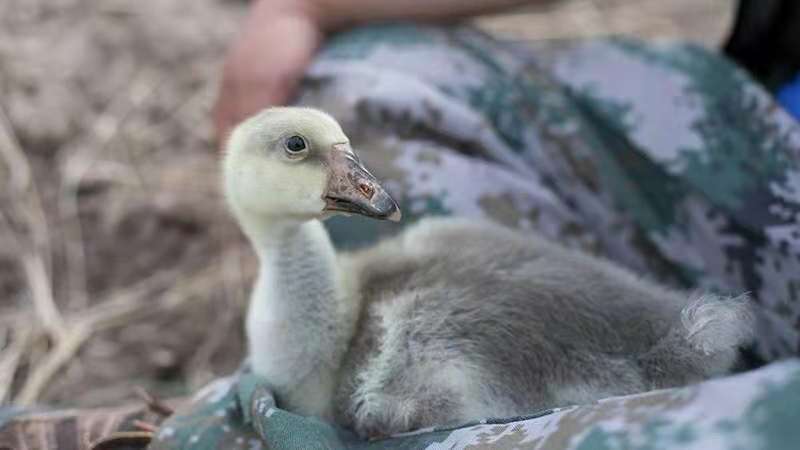
A super mixed-blood chick.
One year later, things became more incredible as “Baby” mated with another domestic goose and began laying eggs.
更令人难以置信的是,宝儿还能繁育后代。
One super hybrid chick came out this time. Tian's excited about watching the bar-headed goose, the hybrid goose and super hybrid babies gather in his bird sanctuary.
在2018年4月26日,这只全球唯一的“斑头鹅”和一只家鹅产下的蛋,孵化成功,又一个新的奇迹诞生了。老田将这只新的奇迹取名为“雁儿”,因为它的祖先就是雁。这下野生的斑头雁当上了爷爷,全球唯一的“斑头鹅”当上了妈妈,它们三代同堂生活在救助站里。下一步,老田想看看这个杂交第二代“雁儿”能否继续繁殖?这样的跨种杂交是否存在生殖隔离?
“There is so much work in the rescue station: artificial incubation, feeding, giving treatments, wild training, recording, monitoring, rehabilitation that benefits the birds, and so on. I am really so fully engaged and fulfilled in my work at the rescue station that I nearly lose track of time,” Tian said.
老田说:“救助有做不完的活儿,孵化、喂食、治疗、野放、记录、观测、看监控、生境改造等等,来到这里只有工作工作工作。”
However, rescue work is only one part of Tian's bird conservation efforts. To protect the birds more effectively, he combines his rescue practices with scientific theory.
Tian insists that a sufficient knowledge of birds is the footstone of bird conservation. He attaches GPS trackers on the birds he rescues in order to analyze their status. Through the data from the trackers, he becomes aware of the main habitats that should be protected.
然而救助工作,只是老田为保护鸟类所做的一部分工作。通过救助,结合科学的理念,从而对鸟类进行更有效的保护,这才体现了老田的智慧。他始终坚持,只有了解鸟类的习性,才能更有效的保护。比如,受伤或者中毒的鸟儿治愈后,佩戴上GPS追踪器后再进行野放,就能了解到它们的飞行轨迹和生存状况。通过追踪器了解到它们重要的栖息地后,那这些重要栖息地就得保护起来了。
Tian believes that one man's power is not enough in bird conservation. He hopes more people pay attention to wild birds.
老田说:“自己做保护力量总是有限的,我希望有更多的人能够了解鸟类,爱护鸟类。”
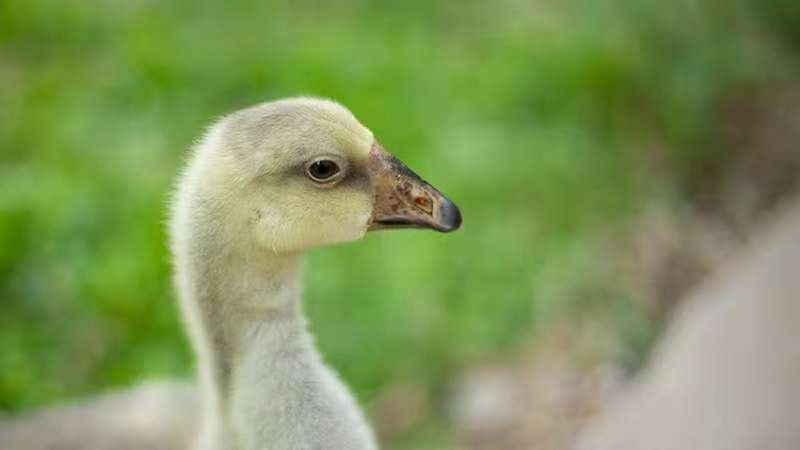
A second-generation super mixed-blood.
The rescue station is getting better and better, and more and more people including ornithologists, volunteers and government staff members come. Even children love to visit the wild birds and enjoy the nature education lectures here.
救助站越做越好,来的人也越来越多。不少鸟类学家来到这里,和老田联手做鸟类科研项目。野保志愿者来到这里,和老田共同探讨鸟类保护之道。小朋友们也喜欢来这里,他们喜欢近距离观看这些被救助的野生鸟类,也喜欢这位黝黑的救助站站长耐心的义务讲解。
It may be Tian's endless exploration of birds that attracts people to the rescue station.
能吸引大家来救助站的,也许就是老田,对鸟类无止境探索的恒心吧。
“If you concentrate on one thing, you can do it well,” Tian said.
老田常说一句话:“只有专心做一件事情,才能把这件事做好。”
Only with endless exploration can bird conservation be effective.
只有不断探索鸟类,才能更加了解鸟类,从而“以鸟为本”做好救助,做好保护。
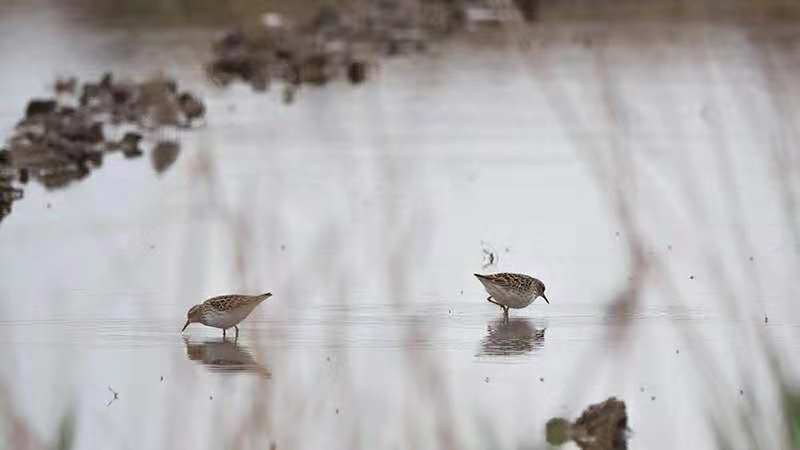
Two waders are foraging near the rescue station.
Director:Lin Yingying
Editor:Lin Yingying
Filmed by: Lin Yingying
Article Written by: Lin Yingying
Copy Editor: Matthew Arrington Watson,Nadim Diab
Producer: Wen Yaru
Chief Editor: Pei Jian,Wang Dongmei
Supervisor: Pang Xinhua


